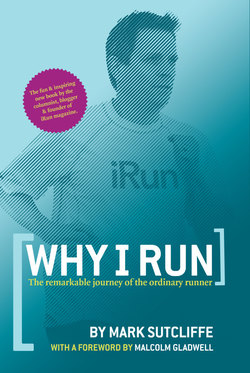Why I Run: The Remarkable Journey of the Ordinary Runner

Реклама. ООО «ЛитРес», ИНН: 7719571260.
Оглавление
Mark MDiv Sutcliffe. Why I Run: The Remarkable Journey of the Ordinary Runner
Foreword by Malcolm Gladwell
Introduction
Running forward, looking back
Why I Run
Dianne, Dad, money
A great running nation
Reaching the tipping point
Blame Pheidippides
Love, hate and winter
Because it’s there
Stumbling through the woods
Faster, harder
The Beer Mile
The ageless runner
Competing against yourself
Why racing beats everyday life
People of audacious hope
Finished at the finish
One day after another
Running the globe
Just like us
The elusive runner’s high
One day out of fifty
Round and round the gravestones
Blood, sweat and other fluids
The over-confident novice
The prodigy returns
The unlikely athletes
37,000 stories
If you can make it there
A leg to run on
It probably won’t kill you
Fit and facing the world
My life as a bunny
The next generation
The coldest day of the year
Ladies first in Boston
Always a runner
The top of the world: flat but steep
A detour on the way to Boston
A new way to commute
Running past the Grim Reaper
Just because
From A to Z
Music to every runner’s ears
Playing it safe
Running for a cause
Nothing can help your running
Fractions
Using your head
Wally and John
A national pride
The charm of the smaller event
Overwhelming and energizing
Guys and gadgets
Shoeless running
Finding more at the finish
A soldier’s story
Fathers and sons
A goofy excuse to run
Running a long way from home
Call her lucky
42.2 years
Footsteps and freedom
A New York dilemma
Running the Sahara
36,680 stories
A few Fox facts
Hope and anger
You’re going to Boston
Finish lines
My last run
Acknowledgements
Отрывок из книги
I started running when I was twelve because I wanted to run races. At that age, it seemed to me to be the point. The summer before I turned thirteen I remember running up and down a farmer’s track, behind our house, in competition with my brother and my father. We would stagger each person’s starting point, according to some elaborate calculation of individual handicap, and time each interval with a big, old-fashioned stopwatch. My goal, at first, was to beat my brother. Then it was to beat my father. And then, when I entered high school and ran track and cross-country, it was to beat as many people as possible in my age group. Running was a competitive activity, like Monopoly or playing cards, for which the only appropriate goal was victory. Once, after winning a cross-country race in high school, I remember my coach asking me if I liked running, and I was utterly bewildered by the question. I had won, hadn’t I? And I won a lot in those years — local races, provincial races — and that was always my answer. Until, at the grand old age of fifteen, I abruptly stopped winning — and all of a sudden I had to decide how I really felt.
In the pages that follow, Mark Sutcliffe will tell you stories about his own running experiences. Superficially, they are nothing at all like mine. He came to running late. I started early. He runs marathons. I was a miler as a kid, and to this day regard races at lengths greater than ten kilometres to be acts of lunacy. We actually went running once and, predictably, he would have been happier going longer and slower and I would have been happier going shorter and faster. But beneath those surface differences, our stories — like all running stories — are very similar. They are all reflections on running’s great paradox: that this most elemental and primal of human activities is also deeply (and occasionally frustratingly) complex.
.....
Many years later, I did become a runner. But I’m not a particularly special one. I’m not, for example, one of those lucky people who discovered, upon taking up running as adults, that they were incredibly fast. The only time I’ve broken the tape at a finish line was at an event where I was the only participant. I’m certainly not an elite athlete.
I haven’t defied the odds to become a runner. I’m not a cancer survivor. I didn’t lose 100 pounds in one year. I didn’t overcome a serious disability, illness or injury to run a marathon.
.....